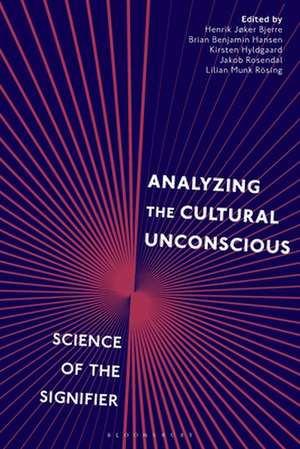Analysing the Cultural Unconscious: Science of the Signifier
Editat de Lilian Munk Rösing, Professor Henrik Jøker Bjerre, Brian Benjamin Hansen, Kirsten Hyldgaard, Jakob Rosendalen Limba Engleză Paperback – 28 iul 2021
| Toate formatele și edițiile | Preț | Express |
|---|---|---|
| Paperback (1) | 217.62 lei 6-8 săpt. | |
| Bloomsbury Publishing – 28 iul 2021 | 217.62 lei 6-8 săpt. | |
| Hardback (1) | 598.45 lei 6-8 săpt. | |
| Bloomsbury Publishing – 22 ian 2020 | 598.45 lei 6-8 săpt. |
Preț: 217.62 lei
Preț vechi: 274.89 lei
-21% Nou
Puncte Express: 326
Preț estimativ în valută:
41.65€ • 45.22$ • 34.98£
41.65€ • 45.22$ • 34.98£
Carte tipărită la comandă
Livrare economică 23 aprilie-07 mai
Preluare comenzi: 021 569.72.76
Specificații
ISBN-13: 9781350262287
ISBN-10: 1350262285
Pagini: 248
Dimensiuni: 156 x 234 mm
Greutate: 0.35 kg
Editura: Bloomsbury Publishing
Colecția Bloomsbury Academic
Locul publicării:London, United Kingdom
ISBN-10: 1350262285
Pagini: 248
Dimensiuni: 156 x 234 mm
Greutate: 0.35 kg
Editura: Bloomsbury Publishing
Colecția Bloomsbury Academic
Locul publicării:London, United Kingdom
Caracteristici
The essays on films and paintings (II.2, II.3, IV.3, and IV.4) are illustrated by screen shots or reproductions and the essay on Lol V. Stein is richly illustrated by material made by the writer herself
Notă biografică
Lilian Munk Rösing is Associate Professor at the Department of Arts and Cultural Studies, University of Copenhagen. She has published four books (three in Danish, one in English) and a large number of articles combining psychoanalysis with literary and cultural criticism. Latest publication: Pixar with Lacan: The Hysteric's Guide to Animation (2016).
Cuprins
IntroductionPart I: Science and the Signifier I.1 "The Cunning of the Signifier", Henrik Jøker Bjerre (Aalborg University, Denmark)I.2 "The Echo of the Signifier in the Body: On Drives Today", Juliet Flower MacCannell (University of California, USA)I.3 "Secret in the Body - the Fantasy Structure of Genes and Brains", Renata Salecl (University of Ljubljana, Slovenia and Birkbeck College, UK) Part II: From Couch to Culture II.1 "Drives and Culture", Mladen Dolar (University of Ljubljana, Slovenia and European Graduate School, Switzerland)II.2 Lars von Trier's Nymphomaniac and the Four Discourses, Kirsten Hyldgaard (Aarhus University, Denmark)II.3 "Courtly Capitalism", Center for Wild AnalysisII.4 "Is there a Way out of the Capitalist Discourse?", René Rasmussen (University of Copenhagen) Part III: Application III.1 "Examples and Surplus-Meaning", Brian Benjamin Hansen (VIA University College, Denmark)III.2 "Literature as Philosophy of the Real: Ethics and Sexual Difference in Coetzee's Disgrace", Kari Jegerstedt (University of Bergen, Norway)III.3 "When I am Beside Myself", Linus Nicolai Carlsen (University of Copenhagen)III.4 "Analysis Sounds Boring - Is there an Analytical Potential in Modern Electronic Music?", Anders Ruby (Aarhus University, Denmark) Part IV: Materiality and the Signifier IV.1 "Lol V. Stein to the Letter", Ida Nissen Bjerre (University of Copenhagen)IV.2 "Lacan and the Archeology of the Subject", Carin Franzén (Linköping University, Sweden)IV.3 "The Signifiers of Cherry Ripe - On the Trauma and Repetition of an Art-historical Motif", Jakob Rosendal (The Women's Museum, Denmark) (editor: Lilian Munk Rösing, University of Copenhagen)IV.4 "Colour of Flesh, Flesh of Colour", Lilian Munk Rösing (University of Copenhagen)
Recenzii
The problem of applied psychoanalysis has historically been unsolvable. But now, the appearance of Analysing the Cultural Unconscious provides a whole new way of thinking about moving from a psychoanalysis focused on the individual to cultural psychoanalysis. Assembling a wide array of top psychoanalytic theorists, this collection opens up a previously unexplored path to thinking psychoanalytically about culture.
Tremendously smart, topical and diverse in its address, this collection really does 'work' the signifier as it promises. These superb essays remind one (not that it is possible to forget) that psychoanalysis is always speaking - out of turn, out of time, but never untimely.
Tremendously smart, topical and diverse in its address, this collection really does 'work' the signifier as it promises. These superb essays remind one (not that it is possible to forget) that psychoanalysis is always speaking - out of turn, out of time, but never untimely.
